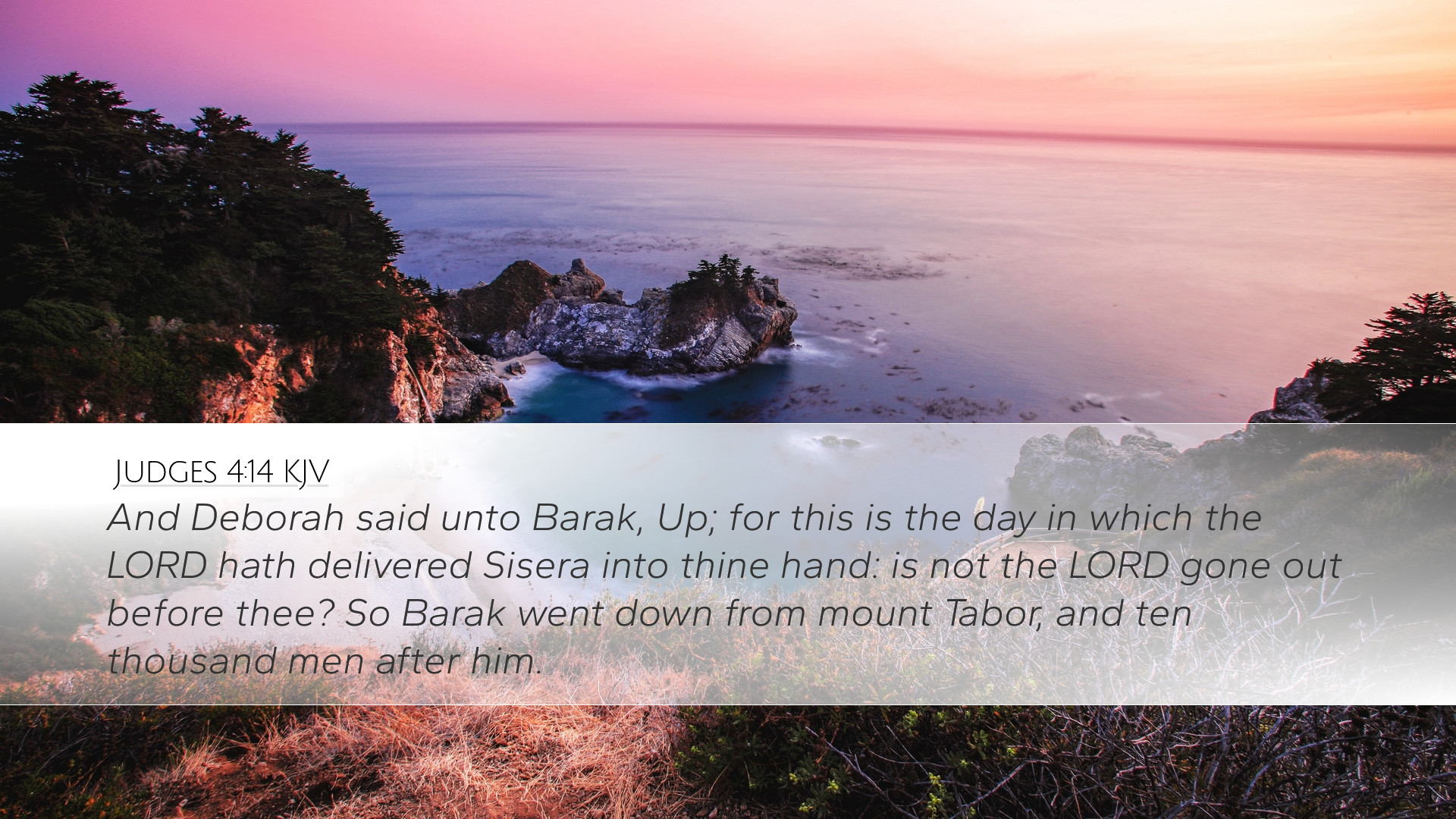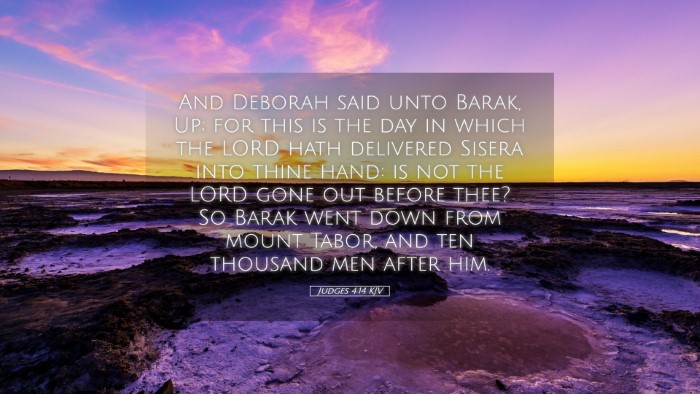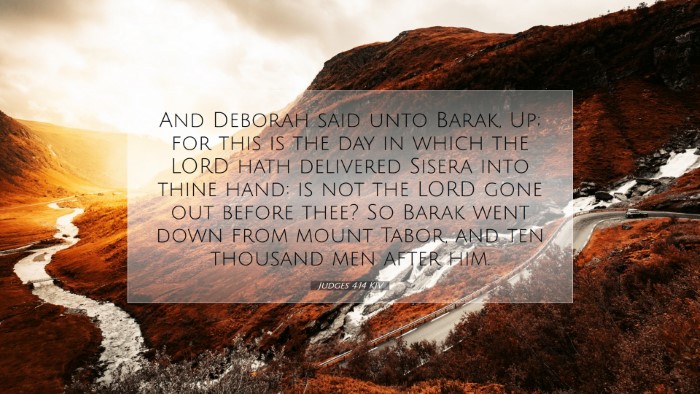Old Testament
Genesis Exodus Leviticus Numbers Deuteronomy Joshua Judges Ruth 1 Samuel 2 Samuel 1 Kings 2 Kings 1 Chronicles 2 Chronicles Ezra Nehemiah Esther Job Psalms Proverbs Ecclesiastes Song of Solomon Isaiah Jeremiah Lamentations Ezekiel Daniel Hosea Joel Amos Obadiah Jonah Micah Nahum Habakkuk Zephaniah Haggai Zechariah MalachiJudges 4:14
Judges 4:14 KJV
And Deborah said unto Barak, Up; for this is the day in which the LORD hath delivered Sisera into thine hand: is not the LORD gone out before thee? So Barak went down from mount Tabor, and ten thousand men after him.
Judges 4:14 Bible Commentary
Judges 4:14 Commentary
Text of Judges 4:14 (ESV): "And Deborah said to Barak, 'Up! For this is the day in which the LORD has given Sisera into your hand. Does not the LORD go out before you?' So Barak went down from Mount Tabor with ten thousand men following him."
Introduction
The context of Judges chapter 4 reveals a significant moment in Israel's history, where divine intervention leads to the liberation of the Israelites from the oppression of Jabin, king of Canaan. Deborah, a prophetess and judge, plays a critical role in mobilizing Barak to action, emphasizing the urgent call to battle that resonates through this verse. Understanding this passage requires us to delve into its theological implications, historical context, and the personalities involved.
The Role of Deborah
Deborah's Leadership: Deborah's authority as both a prophetess and a judge provided the Israelites with a divine perspective during turmoil. As Matthew Henry remarks, "Deborah is called a mother in Israel, and indeed she did act the part of a mother". This highlights the nurturing aspect of her leadership, contrasting with the typical militaristic expectations of her time.
Barak’s Response
The Call to Action: "Up! For this is the day..." underscores the urgency and divine timing of God's will. Albert Barnes notes that Deborah’s proclamation instilled confidence in Barak, urging him to step into the role God intended for him as the leader of Israel's forces against Sisera. The text indicates a moment of clarity, where God's direction becomes evident.
Divine Assurance
Assurance of Victory: The phrase "Does not the LORD go out before you?" emphasizes that the battle's outcome is guaranteed not by military strength but by God’s presence and support. Adam Clarke reflects on this assurance, suggesting it highlights the covenantal relationship between God and Israel – showing God's commitment to His people even in dire circumstances.
Lessons on Faith and Obedience
- Faith in Divine Promises: Deborah’s words serve as a reminder for believers today about trusting in God’s promises. Even when situations appear bleak, God’s faithful presence leads and guides.
- Obedience to Divine Call: Barak's willingness to go "down from Mount Tabor" signifies the importance of obedience and action in response to God's commands. This reflects the essence of faith, which is invariably coupled with works.
- Women in Leadership: The inclusion of Deborah as a judge and prophetess is significant, offering a distinct acknowledgment of women in leadership roles within the biblical narrative. This challenges traditional views and encourages a reevaluation of women’s roles in contemporary church settings.
Theological Implications
This verse not only speaks to the historical narrative of Israel’s battles but also imparts essential theological lessons.
- God’s Sovereignty: The assurance that "the LORD has given Sisera into your hand" demonstrates God’s control over human history. It encourages believers to trust in God’s sovereignty amid life’s challenges.
- Strength in Weakness: By using unlikely leaders like Deborah and Barak, God demonstrates that His strength is made perfect in weakness (2 Corinthians 12:9). This serves as a profound reminder that God can work through any individual, regardless of gender or status.
Conclusion
Judges 4:14 serves as a powerful reminder of the call to faithfulness and obedience in God's mission. Deborah's leadership and Barak’s subsequent action illustrate that God honors those who trust in Him and act according to His word. For pastors, students, theologians, and Bible scholars, this passage invites deep reflection on God's unwavering presence in our endeavors and the vital role of faithful leaders in guiding others toward God's victory.
Reflection Questions
- How can the example of Deborah influence modern church leadership?
- What does Barak's response to Deborah teach us about responding to God's call in our lives?
- In what ways can we recognize and affirm God's sovereignty in our current challenges?


